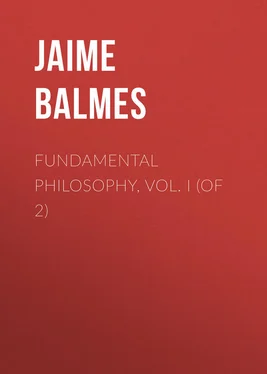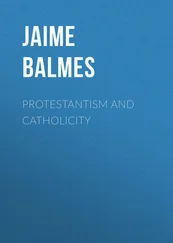Jaime Balmes - Fundamental Philosophy, Vol. I (of 2)
Здесь есть возможность читать онлайн «Jaime Balmes - Fundamental Philosophy, Vol. I (of 2)» — ознакомительный отрывок электронной книги совершенно бесплатно, а после прочтения отрывка купить полную версию. В некоторых случаях можно слушать аудио, скачать через торрент в формате fb2 и присутствует краткое содержание. Жанр: foreign_antique, foreign_prose, на английском языке. Описание произведения, (предисловие) а так же отзывы посетителей доступны на портале библиотеки ЛибКат.
- Название:Fundamental Philosophy, Vol. I (of 2)
- Автор:
- Жанр:
- Год:неизвестен
- ISBN:нет данных
- Рейтинг книги:3 / 5. Голосов: 1
-
Избранное:Добавить в избранное
- Отзывы:
-
Ваша оценка:
- 60
- 1
- 2
- 3
- 4
- 5
Fundamental Philosophy, Vol. I (of 2): краткое содержание, описание и аннотация
Предлагаем к чтению аннотацию, описание, краткое содержание или предисловие (зависит от того, что написал сам автор книги «Fundamental Philosophy, Vol. I (of 2)»). Если вы не нашли необходимую информацию о книге — напишите в комментариях, мы постараемся отыскать её.
Fundamental Philosophy, Vol. I (of 2) — читать онлайн ознакомительный отрывок
Ниже представлен текст книги, разбитый по страницам. Система сохранения места последней прочитанной страницы, позволяет с удобством читать онлайн бесплатно книгу «Fundamental Philosophy, Vol. I (of 2)», без необходимости каждый раз заново искать на чём Вы остановились. Поставьте закладку, и сможете в любой момент перейти на страницу, на которой закончили чтение.
Интервал:
Закладка:
162. They are all three right, and all three wrong. They are right in asserting that the denial of their respective principles is the ruin of the others. They are all wrong in pretending that the denial of the others is not the ruin of their own. Whence then the dispute? From the confusion of ideas, by which they compare principles of very different orders, all indeed very true, but not to be compared with each other for the same reason that we cannot compare the white and the warm, and dispute whether a thing has more degrees of heat or whiteness. Comparison requires not only opposition in the extremes, but also something in common; if things are totally unlike, comparison is impossible.
Descartes' principle is the enunciation of a simple fact of consciousness; that of contradiction is a truth known by evidence; and that of the Cartesians is an assertion that the criterion of evidence is valid, and that it is a truth of reflection expressing the intellectual impulse by which we are borne to believe the truth of what we know by evidence.
The importance of this question requires a special examination of each of the three principles, which we shall make in the next chapters. (16) Конец ознакомительного фрагмента. Текст предоставлен ООО «ЛитРес». Прочитайте эту книгу целиком, купив полную легальную версию на ЛитРес. Безопасно оплатить книгу можно банковской картой Visa, MasterCard, Maestro, со счета мобильного телефона, с платежного терминала, в салоне МТС или Связной, через PayPal, WebMoney, Яндекс.Деньги, QIWI Кошелек, бонусными картами или другим удобным Вам способом.
CHAPTER XVII.
THOUGHT AND EXISTENCE. – DESCARTES' PRINCIPLE
163. Am I certain that I exist? Yes. Can I prove it? No. Proof supposes reasoning; there is no solid reasoning without a firm principle on which to rest it; and there is no firm principle unless we suppose the existence of the reasoning being.
In effect, if he who reasons is not certain of his own existence, he cannot be certain of his own reasoning, since there will be no reasoning if there be no one to reason. Therefore there are, unless we suppose this, no principles on which to rest; there is nothing but illusion, or rather there is neither any illusion, for there can be none where there is no one illuded.
Our existence cannot be demonstrated: we have so clear and strong a consciousness of it that it leaves us no uncertainty; but it is impossible to prove it by reasoning.
164. It is a prejudice and a fatal error to believe ourselves able to prove everything by the use of reason; the principles on which it is founded are prior to its use; the existence of reason, and that of the being that reasons, are prior to both.
Not only are not all things demonstrated, but it may even be demonstrated that some things are indemonstrable. Demonstration is a ratiocination in which we infer from evident propositions, a proposition evidently connected with them. If the premises are of themselves evident, they do not admit of demonstration; if we suppose them in their turn demonstrable, we shall have the same difficulty with respect to those on which the new demonstration is founded; therefore we must either stop at an indemonstrable point, or proceed to infinity, which would be never to finish the demonstration.
165. And it is to be remarked that indemonstrability does not belong solely to certain premises; it is found, in some measure, in every argument by its very nature, abstracting the propositions which compose it. We know that the premises A and B are certain; from them we infer the proposition C. By what right? Because we see that C is connected with A and B. But how do we know this? If by immediate evidence, by intuition, here is something else that cannot be demonstrated, the connection of the conclusion with the premises. If by argument, ratiocination, establishing ourselves on the art of reasoning, there are two considerations, both tending to demonstrate indemonstrability. I. If the principles of the art are indemonstrable, we have at once something indemonstrable; if they are demonstrable, we must make use of others which serve as their basis, and at last either come to one which does not admit of demonstration, or else proceed to infinity. II. How do we know the principles of reasoning to be applicable to this case? By another act of reasoning? Then we shall encounter the same difficulty as in the other case. Is it because we see that it is so? because it is immediately evident? Then here again we have an indemonstrable point. These reflections will clearly show that to demand proof of everything is to demand what is impossible.
166. A being which does not think has no consciousness of itself: the stone exists, but does not know that it exists, neither would man himself in a similar case, were all his intellectual and sensible faculties in complete inaction. We easily conceive the difference of these two states by calling to mind what occurs, when from waking we pass into a profound sleep, and again when we awake from it. The first starting-point of our cognitions is this intimate presence of our internal acts, abstraction made of the questions which may be raised upon their nature. If every thing existed as at present, and there also existed, besides the world which we see, infinite other worlds, not even then would any thing exist for us, had we not those internal acts of which we are speaking. We should be like an insensible body placed in the immensity of space, which would suffer no mutation were every thing around it to disappear, and would perceive no change even if it were itself to sink into the abyss of nothing. On the other hand, if we suppose every thing to be annihilated except this being within us which feels, thinks, and wills, there still remains a point whereon to base the edifice of human cognitions: this being, though alone in immensity, would render itself an account of its own acts to the extent of its ability, and might go into numberless combinations having for their object the possible though not the real.
167. The famous principle of Descartes, I think, therefore I am , has been often attacked, and justly and conclusively so, if this philosopher really understood his principle in the sense which the schools are accustomed to give it. If Descartes presented it as a true argument, as an enthymema with an antecedent and a consequent, the argument was clearly defective in its foundation. For when he said, "I am going to prove my existence with this enthymema: I think, therefore I am: " this objection might have been made; your enthymema is equivalent to a syllogism in this form: whatever thinks, exists; but I think; therefore, I exist. This syllogism, in the supposition of a universal doubt, excluding even the supposition of existence itself, is inadmissable in its propositions and in their connection. In the first place, how do you know that whatever thinks exists? Because nothing can think without existing. How do you know that? Because what does not exist, does not act. But how in its turn do you know this? Supposing every thing to be doubted, nothing to be known, these principles are not known; otherwise we fall short of the supposition of universal doubt, and consequently go out of the question. If any one of these principles must be admitted without proof, it is just as well to admit your own existence and save yourself the trouble of proving it with an enthymema.
In the second place, how do you know that you think? Your argument may be retorted, as dialecticians say, in the following manner: nothing can think without existing; but your existence is doubtful, for you are trying to prove it; therefore you are not sure that you think.
Читать дальшеИнтервал:
Закладка:
Похожие книги на «Fundamental Philosophy, Vol. I (of 2)»
Представляем Вашему вниманию похожие книги на «Fundamental Philosophy, Vol. I (of 2)» списком для выбора. Мы отобрали схожую по названию и смыслу литературу в надежде предоставить читателям больше вариантов отыскать новые, интересные, ещё непрочитанные произведения.
Обсуждение, отзывы о книге «Fundamental Philosophy, Vol. I (of 2)» и просто собственные мнения читателей. Оставьте ваши комментарии, напишите, что Вы думаете о произведении, его смысле или главных героях. Укажите что конкретно понравилось, а что нет, и почему Вы так считаете.












